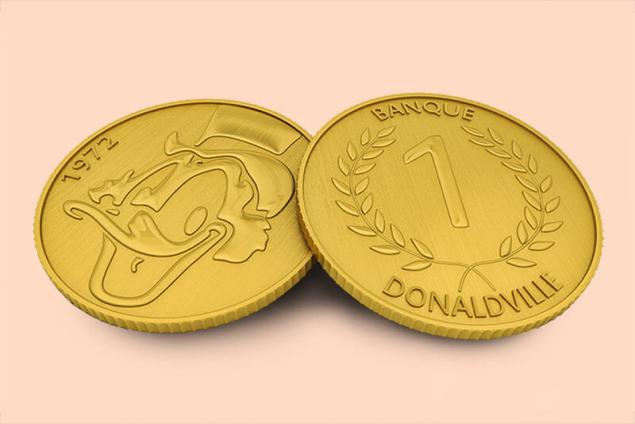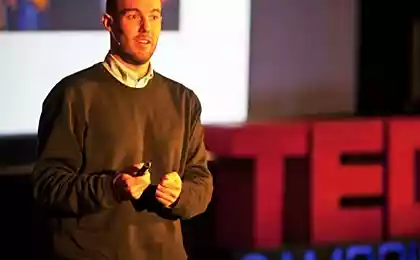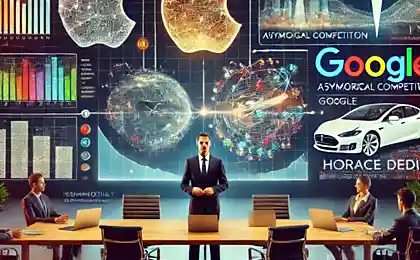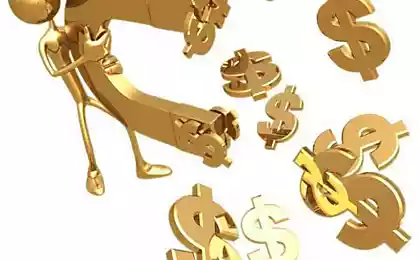608
The modern economy as dystopia: why technology makes people poor
Current economic system is in crisis, similar to the effects of the Industrial revolution. Globalization and the technology boom only increase the gap in income of different population groups. On the reverse side of these seemingly positive trends in his lecture at TED, told canadian journalist and author Chrystia Freeland.

© Rémy Trappier
The age of the global plutocracy the Most important economic fact of our time is that we live in an era of growing income inequality. It is especially noticeable in comparing the well-being of the upper layers of the population and all the others, as confirmed by the study. The most visible examples of this fact are the US and UK, but it's happening in Communist China, post-Communist Russia, India and Canada. We're even seeing it in such favorable social democracies like Sweden, Finland and Germany.
So, in America 1970-ies 10% of the total national income was concentrated at one percent of the population. Today that number has doubled. But even more striking is what happens at the very top of the income distribution. Currently 8 percent of the national income belongs to the 0.1% of Americans. They are where the one percent was 30 years ago. To put that in perspective, lead and other figures that have been calculated by the Secretary of labor in the Clinton administration Robert Reich in 2005.
Reich studied as two well-established wealthy — bill gates and Warren Buffett. He found that it is equivalent to the total profit of 40% of the population with the lowest income level that is 120 million people. Thus, Warren Buffett is now not just a plutocrat, he is one of the most astute observers of this phenomenon. It has another interesting figure: Buffett like to remind you that in 1992 the total income of four hundred of the participants of the Forbes list (and the list of the richest people in America) were $ 300 billion.
Just think about it. You didn't even need to be a billionaire to in 1992 to get on that list. Today this figure has grown five-fold and is 1.7 trillion dollars. No need to explain that we have not seen anything like this in the life of the middle class, whose income has not changed, if not diminished.
We live in an age of global plutocracy, but we soon noticed it. One of the reasons, in my opinion, lies in the scientific phenomenon of the frog in the boiling water. Slow and gradual changes are hard to notice, even if their end result can be quite dramatic. Remember what eventually happened to the poor frog. But that's not all. Try to understand what caused this inequality and what we can do.
The pressure of crony capitalism
The first set of reasons is associated with the policy: tax cuts, financial sector regulation, privatization, and weak legal protection of trade unions. All this creates a system where most of the income goes to the top.
All these political factors can be combined into the notion of so-called crony capitalism. At it political transformation for the group, "their", not really take into account the interests of all others. To get rid of such a system is incredibly difficult. Remember a long and varied reforms against corruption in Russia. About how now, after the deepest financial crisis since the great depression hard to rebuild the banking system. Or how difficult it is to make international corporations, including those whose conditional motto is "do No harm", to pay taxes at least approximately to the extent that middle class. But if, in practice, to get rid of crony capitalism is extremely difficult, from the point of view of the theory — it is an easy task. Ultimately few people can find it a real benefit. Among other things, this is one of those rare issues that unites left and right: criticize crony capitalism as the Central Valley Tea Party, the Occupy Wall Street movement.
Economic factors and the effect of superstars
We understand that, theoretically, crony capitalism is a simple issue. But everything will become more complicated if you think about the economic factors of growing inequality in income levels. By themselves, they are quite familiar. Globalization and the technological revolution, which has launched a two-way transformation of the economy, changing our lives and the world economic system, and also provoked the heyday of the "super-rich".
Just think about it. For the first time in history, if you are an energetic entrepreneur with a great idea or a fantastic new product, you have an instant and almost unrestricted access to the world market with a billion people.
If you are very, very smart and very very lucky, you can get very very rich very very istropolitana illustration of this phenomenon is David Karp. 26-year-old founder of Tumblr recently sold his company to Yahoo for 1.1 billion dollars. For a minute: 1.1 billion dollars, 26 years old. The easiest way to see how new technology and globalization create superstars on the visible fields, like sports or the entertainment industry. Everyone knows that athletes and actors use the opportunities of the modern economy like never before. But today, this effect happens everywhere: we have superstars in the technology, banking, superstar lawyers and superstar architects, chefs, and farmers. There are even, and this is my favorite example, superstar dentists, the most glaring of which is Bernard touati, the Frenchman, the chief of the smiles of celebrities such as Russian oligarch Roman Abramovich and American designer European origin Diane von Furstenberg.
Meritocratic plutocracy and the interests of Nebolsina
But if you observe, as globalization and technological revolution create a global plutocracy, it's quite easy, much harder to understand how this process of perceiving. All because, in contrast with crony capitalism, a large part of the effects of these two factors is positive. Let's start with technology. I like the Internet, mobile devices, I like the fact that everyone far beyond this audience will be able to hear this conversation. I'm also a fan of globalization, which brought hundreds of millions of people from poverty into the middle class. If you are lucky and you live in a rich part of the world, we have access to many products, thus the cost for common goods also decreased significantly. Think of your dishwasher or your t-shirt.
Not like it can be a few things. The first thing that worries me is the ease with which a meritocratic plutocracy can become crony. Imagine that you are a successful entrepreneur who sold his idea or product to people around the world and became a billionaire. Further, the idea to use your mind to manipulate the rules of the global economic and political system in their favor, it becomes very tempting.
And this is not a hypothetical example. Remember Amazon, Apple, Google, Starbucks. This is the most beloved, respected and innovative company. They are particularly adept at working the international tax system to significantly reduce your bills. With the economic impact that we see at the very top of society, and the political power that inevitably entails first, there is the temptation to change the rules to their advantage. Again, this is not a hypothetical statement. That's what the Russian oligarchs did in the deal of the Millennium — the privatization of natural resources. This may explain the transformation of the financial services in the US and the UK.
Aristocracy and the middle class issue
Secondly what worries me is how easily meritocratic plutocracy can become aristocracy. Today's plutocrat be described as an advanced geek, a man who is well aware of the importance of high analytical and mathematical skills in the modern economy. So they are spending unprecedented time and resources educating their own children. The middle class is also concerned about this. But in the global educational race, which begins with nursing school and ends at Harvard, Stanford, Massachusetts Institute of technology, 1% of the rich are increasingly ahead of the other 99%.
The plutocracy may be a meritocracy, but increasingly you have to be born on the top rungs of the social ladder just in order to participate in this zabeleta thing that bothers me the most. The forces that contribute to the development of a global plutocracy and at the same time wash the concept of the middle class of Western industrial economies. Let's start with technology. The processes that create billionaires are also devouring many traditional jobs of the middle class. When was the last time you used a travel agent? In comparison with the industrial revolution, our current giants don't create many jobs.
At its Zenith, G. M. employed hundreds of thousands of people in a Facebook — less than 10 thousand. The same applies to globalization: that is what pulled many of the planet's inhabitants from the poverty line. It happened due to the exclusion of jobs from the Western economy and their transfer to developing countries.
The horror is that there is no economic rule which automatically converted increased economic growth into widely shared prosperity. This data shows that I consider to be the worst economic statistics of today: from the end of the 1990s, productivity was separated from higher wages and employment. This means that our countries are getting richer, companies more efficient, but we have not created jobs and generally do not have to pay people more.
Global changes and new course
The terrible conclusion from all this is that we ought to think about structural unemployment. In the end, on a completely free labor market, you can find a job almost all. But I am concerned about the dystopia in which a few geniuses invent Google and its ilk and the rest of us who work for them.
When all this is making me depressed, I comfort myself in thinking about the Industrial revolution. After all its grim, satanic mills actually worked well, right?
We are richer, healthier, taller (okay, there are some exceptions) and live longer than people in the 19th century. But it is important to remember that before we learned to share the fruit of the Industrial revolution with the broad masses, happened a Long depression of the 1870s, the Great depression of the 1930s, two world wars, Communist revolutions in Russia and China, as well as an era of great social and political upheaval in the West. It all happened by chance: we created the modern state of the General welfare, public education and health care, pensions, and trade associations.
Today we live in an era of economic transformation, on the scale commensurate with that seen during the Industrial revolution. To be sure that this new economy benefits us all and not just the plutocrats, we need to embark on the path of comparably ambitious social and political change. We need a new course. published
P. S. And remember, just changing your mind — together we change the world! © Join us at Facebook , Vkontakte, Odnoklassniki
Source: theoryandpractice.ru

© Rémy Trappier
The age of the global plutocracy the Most important economic fact of our time is that we live in an era of growing income inequality. It is especially noticeable in comparing the well-being of the upper layers of the population and all the others, as confirmed by the study. The most visible examples of this fact are the US and UK, but it's happening in Communist China, post-Communist Russia, India and Canada. We're even seeing it in such favorable social democracies like Sweden, Finland and Germany.
So, in America 1970-ies 10% of the total national income was concentrated at one percent of the population. Today that number has doubled. But even more striking is what happens at the very top of the income distribution. Currently 8 percent of the national income belongs to the 0.1% of Americans. They are where the one percent was 30 years ago. To put that in perspective, lead and other figures that have been calculated by the Secretary of labor in the Clinton administration Robert Reich in 2005.
Reich studied as two well-established wealthy — bill gates and Warren Buffett. He found that it is equivalent to the total profit of 40% of the population with the lowest income level that is 120 million people. Thus, Warren Buffett is now not just a plutocrat, he is one of the most astute observers of this phenomenon. It has another interesting figure: Buffett like to remind you that in 1992 the total income of four hundred of the participants of the Forbes list (and the list of the richest people in America) were $ 300 billion.
Just think about it. You didn't even need to be a billionaire to in 1992 to get on that list. Today this figure has grown five-fold and is 1.7 trillion dollars. No need to explain that we have not seen anything like this in the life of the middle class, whose income has not changed, if not diminished.
We live in an age of global plutocracy, but we soon noticed it. One of the reasons, in my opinion, lies in the scientific phenomenon of the frog in the boiling water. Slow and gradual changes are hard to notice, even if their end result can be quite dramatic. Remember what eventually happened to the poor frog. But that's not all. Try to understand what caused this inequality and what we can do.
The pressure of crony capitalism
The first set of reasons is associated with the policy: tax cuts, financial sector regulation, privatization, and weak legal protection of trade unions. All this creates a system where most of the income goes to the top.
All these political factors can be combined into the notion of so-called crony capitalism. At it political transformation for the group, "their", not really take into account the interests of all others. To get rid of such a system is incredibly difficult. Remember a long and varied reforms against corruption in Russia. About how now, after the deepest financial crisis since the great depression hard to rebuild the banking system. Or how difficult it is to make international corporations, including those whose conditional motto is "do No harm", to pay taxes at least approximately to the extent that middle class. But if, in practice, to get rid of crony capitalism is extremely difficult, from the point of view of the theory — it is an easy task. Ultimately few people can find it a real benefit. Among other things, this is one of those rare issues that unites left and right: criticize crony capitalism as the Central Valley Tea Party, the Occupy Wall Street movement.
Economic factors and the effect of superstars
We understand that, theoretically, crony capitalism is a simple issue. But everything will become more complicated if you think about the economic factors of growing inequality in income levels. By themselves, they are quite familiar. Globalization and the technological revolution, which has launched a two-way transformation of the economy, changing our lives and the world economic system, and also provoked the heyday of the "super-rich".
Just think about it. For the first time in history, if you are an energetic entrepreneur with a great idea or a fantastic new product, you have an instant and almost unrestricted access to the world market with a billion people.
If you are very, very smart and very very lucky, you can get very very rich very very istropolitana illustration of this phenomenon is David Karp. 26-year-old founder of Tumblr recently sold his company to Yahoo for 1.1 billion dollars. For a minute: 1.1 billion dollars, 26 years old. The easiest way to see how new technology and globalization create superstars on the visible fields, like sports or the entertainment industry. Everyone knows that athletes and actors use the opportunities of the modern economy like never before. But today, this effect happens everywhere: we have superstars in the technology, banking, superstar lawyers and superstar architects, chefs, and farmers. There are even, and this is my favorite example, superstar dentists, the most glaring of which is Bernard touati, the Frenchman, the chief of the smiles of celebrities such as Russian oligarch Roman Abramovich and American designer European origin Diane von Furstenberg.
Meritocratic plutocracy and the interests of Nebolsina
But if you observe, as globalization and technological revolution create a global plutocracy, it's quite easy, much harder to understand how this process of perceiving. All because, in contrast with crony capitalism, a large part of the effects of these two factors is positive. Let's start with technology. I like the Internet, mobile devices, I like the fact that everyone far beyond this audience will be able to hear this conversation. I'm also a fan of globalization, which brought hundreds of millions of people from poverty into the middle class. If you are lucky and you live in a rich part of the world, we have access to many products, thus the cost for common goods also decreased significantly. Think of your dishwasher or your t-shirt.
Not like it can be a few things. The first thing that worries me is the ease with which a meritocratic plutocracy can become crony. Imagine that you are a successful entrepreneur who sold his idea or product to people around the world and became a billionaire. Further, the idea to use your mind to manipulate the rules of the global economic and political system in their favor, it becomes very tempting.
And this is not a hypothetical example. Remember Amazon, Apple, Google, Starbucks. This is the most beloved, respected and innovative company. They are particularly adept at working the international tax system to significantly reduce your bills. With the economic impact that we see at the very top of society, and the political power that inevitably entails first, there is the temptation to change the rules to their advantage. Again, this is not a hypothetical statement. That's what the Russian oligarchs did in the deal of the Millennium — the privatization of natural resources. This may explain the transformation of the financial services in the US and the UK.
Aristocracy and the middle class issue
Secondly what worries me is how easily meritocratic plutocracy can become aristocracy. Today's plutocrat be described as an advanced geek, a man who is well aware of the importance of high analytical and mathematical skills in the modern economy. So they are spending unprecedented time and resources educating their own children. The middle class is also concerned about this. But in the global educational race, which begins with nursing school and ends at Harvard, Stanford, Massachusetts Institute of technology, 1% of the rich are increasingly ahead of the other 99%.
The plutocracy may be a meritocracy, but increasingly you have to be born on the top rungs of the social ladder just in order to participate in this zabeleta thing that bothers me the most. The forces that contribute to the development of a global plutocracy and at the same time wash the concept of the middle class of Western industrial economies. Let's start with technology. The processes that create billionaires are also devouring many traditional jobs of the middle class. When was the last time you used a travel agent? In comparison with the industrial revolution, our current giants don't create many jobs.
At its Zenith, G. M. employed hundreds of thousands of people in a Facebook — less than 10 thousand. The same applies to globalization: that is what pulled many of the planet's inhabitants from the poverty line. It happened due to the exclusion of jobs from the Western economy and their transfer to developing countries.
The horror is that there is no economic rule which automatically converted increased economic growth into widely shared prosperity. This data shows that I consider to be the worst economic statistics of today: from the end of the 1990s, productivity was separated from higher wages and employment. This means that our countries are getting richer, companies more efficient, but we have not created jobs and generally do not have to pay people more.
Global changes and new course
The terrible conclusion from all this is that we ought to think about structural unemployment. In the end, on a completely free labor market, you can find a job almost all. But I am concerned about the dystopia in which a few geniuses invent Google and its ilk and the rest of us who work for them.
When all this is making me depressed, I comfort myself in thinking about the Industrial revolution. After all its grim, satanic mills actually worked well, right?
We are richer, healthier, taller (okay, there are some exceptions) and live longer than people in the 19th century. But it is important to remember that before we learned to share the fruit of the Industrial revolution with the broad masses, happened a Long depression of the 1870s, the Great depression of the 1930s, two world wars, Communist revolutions in Russia and China, as well as an era of great social and political upheaval in the West. It all happened by chance: we created the modern state of the General welfare, public education and health care, pensions, and trade associations.
Today we live in an era of economic transformation, on the scale commensurate with that seen during the Industrial revolution. To be sure that this new economy benefits us all and not just the plutocrats, we need to embark on the path of comparably ambitious social and political change. We need a new course. published
P. S. And remember, just changing your mind — together we change the world! © Join us at Facebook , Vkontakte, Odnoklassniki
Source: theoryandpractice.ru
How to choose a water heater for villas
Why physicists can't stand the information paradox of black holes?























